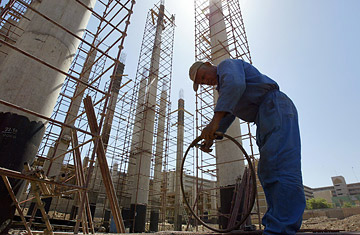
Construction takes place in central Baghdad.
On any given day in Baghdad it's hard to envision a city on the rise amid the shattered buildings, fields of trash and pools of smelly greenish waste water baking under the sun in many neighborhoods. But a few urban planners in the Iraqi government are dreaming big nonetheless. On the drawing board are plans for overhaul and expansion of Baghdad's bridges, roads and sewage systems, plus ambitious commercial development. Planners are scouting sites around Baghdad to build a five-star hotel, an international fairground, a cultural center, a library, a park with a lake and fountains and an aquarium. "Everybody is really serious about this," says Tahseen al-Sheikhly, civilian spokesman for the Iraqi government. The Iraqi government has allocated $3 billion to rebuild Baghdad's infrastructure in a plan spanning three years.
Where will the money come from? Al-Sheikhly says still more outside investment is needed to revitalize the city. That kind of talk only compounds the grumpiness of the country's biggest donor: the U.S. government. Washington is increasingly unhappy over the Iraqi government's seeming reluctance to spend funds from its own coffers on reconstruction projects. "Despite Iraq earning billions of dollars in oil revenue in the past five years, U.S. taxpayer money has been the overwhelming source of Iraq reconstruction funds," said Senator John Warner of Virginia, the ranking Republican on the Senate Armed Services Committee. "It is time for the sovereign government of Iraq, using its revenues, expenditures and surpluses, to fully assume the responsibility to provide essential services and improve the quality of life for the Iraqi people."
Warner's statement followed the release of a report by the Government Accountability Office on annual Iraqi oil revenues and Iraqi government spending on security and reconstruction efforts. The report, requested by Warner and Senate Armed Services Committee Chairman Carl Levin of Michigan found that Washington had underwritten $48 billion for stabilization and reconstruction activities in Iraq since invading in 2003. The Iraqi government, meanwhile, grossed an estimated $96 billion in revenues from 2005 to 2007, almost entirely from oil. Between $67 another $79 billion in oil revenues is projected for Iraq in 2008 with prices remaining at record levels on the world market. That leaves the Iraqi government with a budget surplus this year of roughly $50 billion, which is managed by the Central Bank of Iraq along with the country's other revenues. Yet Iraq has spent only a fraction of its own money on reconstruction. The GAO report found that the Iraqi government spent just $12.2 billion of its capital investment budget in 2007. Iraqi central ministries spent only 11% of their capital investment budgets in 2007, shelling out a relatively small sum of $896 million for reconstruction projects.
"The Iraqi government now has tens of billions of dollars at its disposal to fund large-scale reconstruction projects. It is inexcusable for U.S taxpayers to continue to foot the bill for projects the Iraqis are fully capable of funding themselves," said Levin. "We should not be paying for Iraqi projects, while Iraqi oil revenues continue to pile up in the bank including outrageous profits from $4 a gallon gas prices in the U.S. We should require that U.S. taxpayers be reimbursed for the cost of large projects."
While some of Iraq's surplus funds sit in U.S. accounts, no Iraqi officials reached by TIME expressed any concern that they would be able to access the money. All the funds are managed by the Central Bank of Iraq and spent on government orders. Iraqi officials say continuing violence has undoubtedly hindered the rebuilding. A shortage of skilled officials in key ministries and anti-corruption safeguards have also slowed Iraqi reconstruction initiatives, U.S. and Iraqi officials say.
"Yes it's true that the Iraqi government is spending little on reconstruction," says Ayad Al-Samariee, the head of the finance committee in the Iraqi parliament. "The weak Iraqi capability to do big projects, maybe at the end of 2008, will improve."
But the disparity between U.S. spending and Iraqi spending suggests that leadership in Baghdad would rather see outside powers foot the bill for the country's rehabilitation while saving windfall oil profits. Signs of Iraq's slowness to rebuild are everywhere in Baghdad. Roughly 20% of the city is without proper sewage pipes. Published statistics say the Baghdad is getting roughly 11 hours of electricity a day on average, but many residents go days with only sporadic bursts of power. Iraqi officials say fixing just this problem could take up to 10 years. Chronic electricity shortages for another decade mean little energy for construction, making Iraqi hopes for a renewed capital seem distant. "We're talking about a dream," al-Sheikhly says. "It has always been a dream." With reporting by Mazin Ezzat/Baghdad
